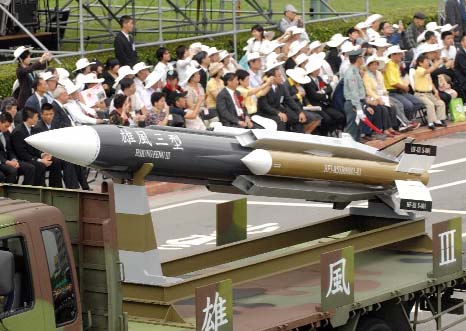
AFP, Taipei :
A Taiwanese warship mistakenly launched a supersonic “aircraft carrier killer” missile towards China on Friday, the navy said, as ties between the island and its once bitter rival deteriorate.
The domestically developed Hsiung-feng III (Brave Wind) missile, with a range of 300 kilometres, flew about 75 kilometres before plunging into waters off Penghu, a Taiwanese-administered island group in the Taiwan Strait.
The navy said it was not immediately clear how the missile had come to be launched, but suggested it could have been due to human error.
“Our initial investigation found that the operation was not done in accordance with normal procedure,” Vice Admiral Mei Chia-shu told reporters, adding that an investigation was under way.
The missile was fired during a drill at around 8:10 am (0010 GMT) from a 500-tonne missile ship docked at a naval base in the southern city of Tsoying and flew in the direction of China.
Helicopters and navy ships were sent to search for the missile, Mei said, adding that the military had reported the gaffe to the island’s top security body, the National Security Conference.
Taiwan’s Mainland Affairs Council, which handles China policy, declined to say whether the incident had been reported to Beijing.
Ties between Taipei and Beijing have deteriorated noticeably since President Tsai Ing-wen of the China-sceptic Democratic Progressive Party (DPP) was elected in January.
China still insists that self-ruling Taiwan is part of its territory, even though the two sides split in 1949 after a civil war, and has not ruled out using force to bring about reunification.
The navy said the missile went through the trawler, but did not explode, nor did it sink the fishing vessel.
It added that it was not immediately clear how the missile, which has a range of 300 kilometres, had come to be launched, but suggested it could have been due to human error.
“Our initial investigation found that the operation was not done in accordance with normal procedure,” Vice Admiral Mei Chia-shu told reporters, adding that an investigation was under way.
Helicopters and navy ships were sent to search for the missile, Mei said, adding that the military had reported the gaffe to the island’s top security body, the National Security Conference.
Taiwan’s Mainland Affairs Council, which handles China policy, declined to say whether the incident had been reported to Beijing.
Official communications between the council and its Chinese counterpart have effectively been frozen by Beijing over Taiwan’s new government refusing to recognise the “one China” concept.
The tenet, agreed by Beijing and Taiwan’s then-ruling Nationalists in 1992, established that there is only one China, but with each side reserving the right to interpret the concept as they see fit.
Analysts said Friday’s incident drew attention to how damaging the freeze in communications could prove.
“This event highlights the importance of communications between the two sides… in order to reduce the possibility of any misjudgement,” Professor Alexander Huang from Tamkang University told AFP.
A Taiwanese warship mistakenly launched a supersonic “aircraft carrier killer” missile towards China on Friday, the navy said, as ties between the island and its once bitter rival deteriorate.
The domestically developed Hsiung-feng III (Brave Wind) missile, with a range of 300 kilometres, flew about 75 kilometres before plunging into waters off Penghu, a Taiwanese-administered island group in the Taiwan Strait.
The navy said it was not immediately clear how the missile had come to be launched, but suggested it could have been due to human error.
“Our initial investigation found that the operation was not done in accordance with normal procedure,” Vice Admiral Mei Chia-shu told reporters, adding that an investigation was under way.
The missile was fired during a drill at around 8:10 am (0010 GMT) from a 500-tonne missile ship docked at a naval base in the southern city of Tsoying and flew in the direction of China.
Helicopters and navy ships were sent to search for the missile, Mei said, adding that the military had reported the gaffe to the island’s top security body, the National Security Conference.
Taiwan’s Mainland Affairs Council, which handles China policy, declined to say whether the incident had been reported to Beijing.
Ties between Taipei and Beijing have deteriorated noticeably since President Tsai Ing-wen of the China-sceptic Democratic Progressive Party (DPP) was elected in January.
China still insists that self-ruling Taiwan is part of its territory, even though the two sides split in 1949 after a civil war, and has not ruled out using force to bring about reunification.
The navy said the missile went through the trawler, but did not explode, nor did it sink the fishing vessel.
It added that it was not immediately clear how the missile, which has a range of 300 kilometres, had come to be launched, but suggested it could have been due to human error.
“Our initial investigation found that the operation was not done in accordance with normal procedure,” Vice Admiral Mei Chia-shu told reporters, adding that an investigation was under way.
Helicopters and navy ships were sent to search for the missile, Mei said, adding that the military had reported the gaffe to the island’s top security body, the National Security Conference.
Taiwan’s Mainland Affairs Council, which handles China policy, declined to say whether the incident had been reported to Beijing.
Official communications between the council and its Chinese counterpart have effectively been frozen by Beijing over Taiwan’s new government refusing to recognise the “one China” concept.
The tenet, agreed by Beijing and Taiwan’s then-ruling Nationalists in 1992, established that there is only one China, but with each side reserving the right to interpret the concept as they see fit.
Analysts said Friday’s incident drew attention to how damaging the freeze in communications could prove.
“This event highlights the importance of communications between the two sides… in order to reduce the possibility of any misjudgement,” Professor Alexander Huang from Tamkang University told AFP.

